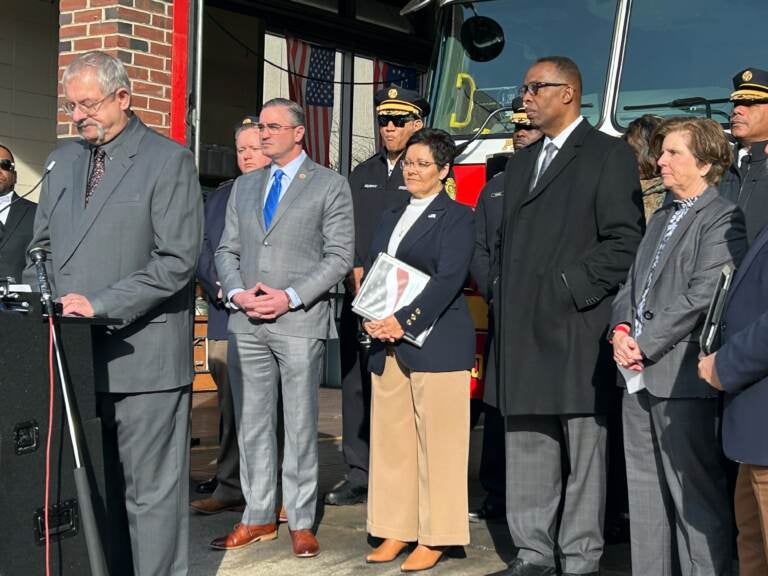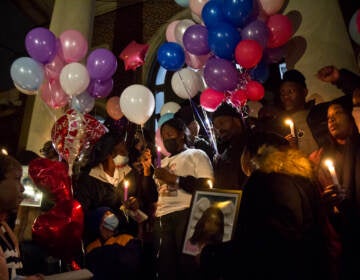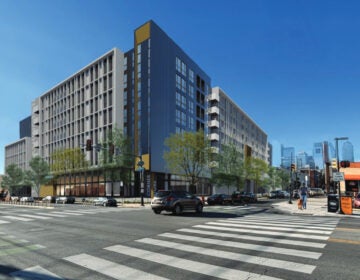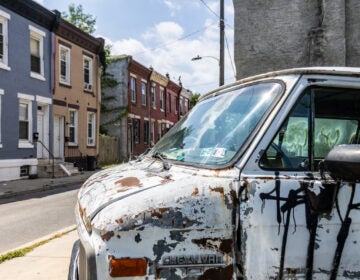U.S. Fire Administrator commemorates Fairmount fire in Philly, announces national strategy
The Fairmount fire, which killed a dozen people including nine children, is the type of tragedy U.S. Fire Administrator Lori Moore-Merrell hopes to prevent.

U.S. Fire Administrator Lori Moore-Merrell (center) stands with city officials and representatives of national fire safety organizations at a press event in Philly Wednesday. (Sophia Schmidt/WHYY)
Roughly a year after a deadly rowhouse fire killed a dozen people in Philadelphia’s Fairmount neighborhood, the U.S. Fire Administrator visited the city to talk about ongoing issues in fire safety — and the federal government’s new strategy to address them.
“Fire remains a serious threat to public safety,” said U.S. Fire Administrator Lori Moore-Merrell during a press conference Wednesday at a fire station in Old City. “America is still burning.”
The Fairmount fire happened last January in a two-unit Philadelphia Housing Authority row home, with battery-powered smoke alarms that weren’t operating the day of the fire, no sprinkler system, and no fire escape. Nine of the victims were children.
“While fire can impact anyone, unfortunately, we’ve seen time and again that it disproportionately affects our most vulnerable populations: our elderly, our children, our disabled, and our low-income families,” Moore-Merrell said.
In Philadelphia last year, more than 40 people died and over 200 people were injured in fires, according to city Fire Commissioner Adam Thiel. More than 700 families — or close to 2,000 Philadelphians — were displaced from their homes due to fires in 2022.
“We have two burn centers in the city of Philadelphia and they’re both full all the time,” Thiel said. “It doesn’t have to be that way.”
Like the Fairmount row house, many older buildings lack up-to-date fire safety systems. Experts say fires burn faster and hotter now than they did in decades past — in part because of new building materials.
The U.S. Fire Administration plans to focus on incentivizing the adoption of stronger fire codes and standards at the state and local levels, as well as helping fund local enforcement of these standards.
After the Fairmount tragedy, U.S. Rep. Madeleine Dean of Montgomery County introduced a bill that would require all federally assisted housing to have hardwired or tamper-resistant battery-powered smoke detectors.
The U.S. Fire Administration also plans to use new investigatory power under a law passed after an even deadlier fire in the Bronx last year. The agency will look at the causes of fires, and what makes them so deadly — then make recommendations around safety improvements for similar buildings.
Other priorities for the U.S. Fire Administration include investing in a national apprenticeship program to deal with firefighter shortages, training firefighters to address wildfires made worse by climate change, and creating a “comprehensive firefighter cancer strategy,” with investments in research, better access to health screenings for firefighters, and efforts to reduce firefighters’ workplace exposure to toxic chemicals like PFAS.
Philadelphia officials are also calling on property owners and developers to take fire seriously and retrofit buildings with safety features when needed. Fire Commissioner Thiel said fire safety is the responsibility of developers, property owners, investors, landlords, and residents — not just the city.
“We are doing everything we can, and it is simply not enough,” he said. “We need your help. We need everybody’s help.”

Subscribe to PlanPhilly
WHYY is your source for fact-based, in-depth journalism and information. As a nonprofit organization, we rely on financial support from readers like you. Please give today.








